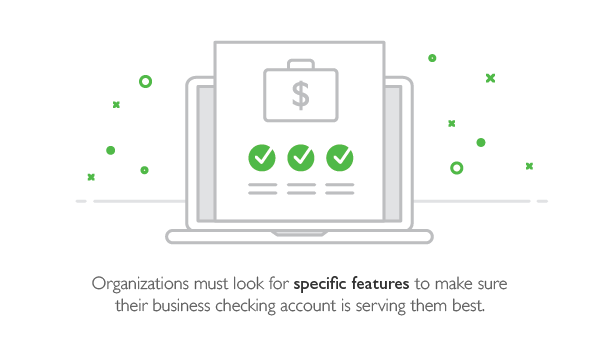It’s generally a good idea to keep your personal and business finances separate. This makes it easier to track business expenses for tax purposes and leaves you less exposed to certain liabilities. Keeping a separate business checking account is also more professional. Not to mention, you’re going to need a business banking account if you plan on taking out any business-related loans, according to The Balance Small Business contributor Jean Murray.
But what exactly should you look for when choosing a business checking account? Whether you’re opening your very first business banking account or are switching to a new financial institution, here are a few tips to keep in mind during your search.

Start with the basics
At a minimum, the bank you work with should meet certain requirements, including the following:
FDIC insurance: This insures up to $250,000 in deposits in the event that a bank goes out of business.
Debit cards: Preferably you should be allowed more than one, and they shouldn’t come at any additional cost to you or your business.
Account access: Some things can’t wait until morning, so make sure your bank offers an around-the-clock online banking option.
Online statements: Again, these should be free.
Security and protection: Always inquire about how the financial institution keeps your business’s funds secure from fraud.
While you’re at it, ask about fees for opening the account and any recurring maintenance fees for the account. Many business checking accounts have them, but they’re usually fairly easy to get waived by meeting certain requirements. Also look into ATM fees, cash-deposit limits and overdraft protection.
Online banking services
Even if your business collects a lot of its earnings in cash, it’s incredibly useful to be able to track account activity, check your balance and review pending transactions from your laptop or smartphone.
Simply put, online banking is more or less an expectation for business checking accounts, and rarely, if ever, comes at an additional cost to the customer. Also ask about ACH transfers and online bill pay. Many banks offer these electronic transactions free of charge.
What’s more, online banking can be highly convenient if you’re borrowing money from the same bank that supports your business-checking account. At Bank Midwest, our business customers can automatically have their loan payment debited from their checking account.
Expertise and scalability
There may come a time when your small business isn’t so small anymore. While that’s certainly a bridge you can cross once you get there, it’s nice to know that your bank can support your business as its cash flows and financial needs scale up.
Ideally, your bank will also have experience financing loans and underwriting insurance for companies in your industry. This expertise and experience can be useful as your organization makes financial decisions pertaining to growth.
Long story short, a strong business-banking institution can provide a lot more than just a place to keep your money. It can also provide services and counsel that will help you manage your funds more effectively.
Interest or no interest?
Business interest checking is not right for every company, but it’s worth asking whether or not it’s right for yours.
Interest-bearing accounts are a great way to turn your money into more money if you meet the minimum requirements to avoid maintenance fees. In order to waive those fees, you may be required to maintain a minimum balance. Depending on the interest rate and the cost of that fee, business interest may or may not be worth it for your company if you don’t qualify for fee-free service.
More questions?
Bank Midwest has multiple business checking account options to suit any business.
Feel free to stop by one of our branches or contact us online to learn more.
